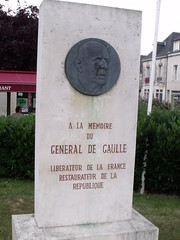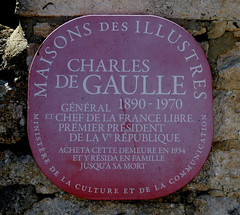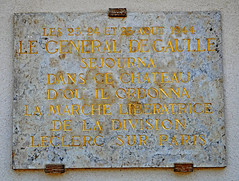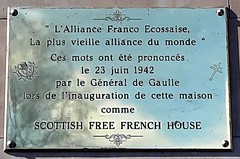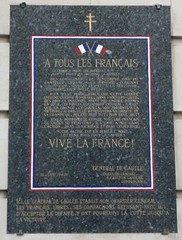General Charles De Gaulle


General Charles De Gaulle
(1890-1970)
President of the French National Committee, statesman, soldier, political reformer, 1st President of the Fifth Republic of France, and French Army Brigade General
Family tree
Commemorated on 13 plaques
General Charles De Gaulle President of the French National Committee set up the Headquarters of the Free French Forces here in 1940
4 Carlton Gardens, London, United Kingdom where they lived
Charles de Gaulle 1890-1970 Soldier, Statesman and Political Reformer. General and leader of the Free French forces during the war against Hitler. First President of the Fifth Republic of France. Lived in this house.
99 Frognal, Hampstead, London, United Kingdom where they lived
A la memoire du General de Gaulle. Liberateur de la France. Restaurateur de la Republique
English translation: In the memory of General de Gaulle. Liberator of France. Restaurateur de la Republique [AWS Translate]
General de Gaulle memorial - Quai du Général de Gaulle, Amboise, France where they is commemorated
Charles de Gaulle habita cet immeuble de 1932 à 1937
English translation: Charles de Gaulle lived in this building from 1932 to 1937
110 boulevard Raspail, Paris, France where they lived (1932-1937)
Charles de Gaulle 1890-1970 Blessé le 15 Août 1914 à la bataille de Dinant, le lieutenant Charles de Gaulle , futur Président de la République Française retrouvera en cette maison, le 16 août , sa sœur Marie-Agnès, épouse d’Alfred Caillau, ingénieur au charbonnages du Poirier.
English translation: Charles de Gaulle 1890-1970. Wounded on 15 August 1914 at the battle of Dinant, Lieutenant Charles de Gaulle, future President of the French Republic, found in this house, on August 16, his sister Marie-Agnes, wife of Alfred Caillau, engineer in the Poirier coal mines.
28 Rue d’Assaut , Charleroi, Belgium where they visited
Ici est né en l’an 1890, le général de Gaulle , promoteur de la résistance française. Juin 1940 Libérateur de la Patrie
English translation: General de Gaulle, promoter of the French Resistance was born in 1890. June 1940 Liberator of the Fatherland
9 rue Princesse , Lille, France where they was born (1890)
Charles de Gaulle, 1890-1970, Général et Chef de la France Libre, premier Président de la Veme République, acheta cette demeure en 1934 et y résida en famille jusqu'à sa mort.
English translation: Charles de Gaulle, 1890-1970, General and Head of France Libre, first President of the Fifth Republic, bought this house in 1934 and resided here as a family until his death.
1 rue de Charles de Gaulle, Colombey-les-Deux-Églises, France where they lived (1934)
Les 23, 24 et 25 août 1944 le Général de Gaulle sejourna dans ce château d'ou il ordonna la marche libératrice de la Division Leclerc sur Paris.
English translation: On 23, 24 and 25 August 1944 General de Gaulle was in this castle where he ordered the liberation march of the Leclerc Division on Paris.
Entrance façade, Château de Rambouillet, Rambouillet, France where they was (1944)
Il Presidente della Repubblica Francese Charles de Gaulle e il Presidente della Repubblica Italiana Giovanni Gronchi il 24 Giugno 1959 sostarono in questa casa nella ricorrenza delle celebrazioni centenarie della Battaglia di Solferino e San Martino
English translation: The President of the French Republic Charles de Gaulle and the President of the Italian Republic Giovanni Gronchi stopped in this house on 24 June 1959 on the occasion of the centenary celebrations of the Battle of Solferino and San Martino.
, Cavriana, Italy where they stayed (1959)
"L'Alliance Franco Ecossaise La Plus vieille alliance du monde" Ces mots ont ete prononces le 23 Juin 1942 par le General de Gaulle de l'auguration de cette maison comme Scottish Free French House
English translation: “L'Alliance Franco Scottish The oldest alliance in the world” These words were pronounced on 23 June 1942 by General de Gaulle of the auguration of this house as Scottish Free French House [AWS Translate]
, Edinburgh, United Kingdom where they visited (1942)
À tous les français La France a perdu une bataille! Mais la France n'a pas perdu la guerre! Des gouvernants de rencontre ont pu capituler, cédant à la panique, oubliant l'honneur, livrant le pays à la servitude. Cependant, rien n'est perdu! Rien n'est perdu, parce que cette guerre est une guerre mondiale. Dans l'univers libre, des forces immenses n'ont pas encore donné. Un jour, ces forces écraseront l'ennemi. Il faut que la France, ce jour la, soit présente à la victoire. Alors, elle retrouvera sa liberté et sa grandeur. Tel est mon but, mon seul but! Voilà pourquoi je convie, tous les français où qu'ils se trouvent, à s'unir à moi dans l'action, dans le sacrifice et dans l'espérance. Notre patrie est en péril de mort. Luttons tous pour la sauver! Vive la France! Général de Gaulle, quartier général, 4 Carlton Gardens, London SW1. 18 juin 1940. Ici, le Général de Gaulle établit son quartier général. Les français libres, ses compagnons refusant avec lui d'accepter la défaite, y ont poursuivi la lutte jusqu'à la victoire.
English translation: To all the French France has lost a battle! But France has not lost the war! Meeting rulers were able to surrender, giving in to panic, forgetting honor, delivering the country to servitude. However, nothing is lost! Nothing is lost, because this war is a world war. In the free universe, huge forces have not yet given. One day, these forces will crush the enemy. France must be present for victory on this day. Then she will regain her freedom and her greatness. That is my goal, my only goal! That is why I invite all the French wherever they are to join me in action, in sacrifice and in hope. Our homeland is in danger of death. Let's all fight to save her! Long live France! General de Gaulle, Headquarters, 4 Carlton Gardens, London SW1. June 18, 1940. Here, General de Gaulle establishes his headquarters. The free French, his companions refusing with him to accept defeat, continued the struggle there until victory. [AWS Translate]
4 Carlton Gardens, St James's , London, United Kingdom where they was
En cette église le 7 Avril 1921 a été célébré le mariage du Capitaine Charles de Gaulle et de Yvonne Vendroux qui en ce lieu a été baptisée et a communié. Charles de Gaulle 1890-1970 Yvonne Vendroux 1900-1979
English translation: In this church on April 7, 1921 was celebrated the wedding of Captain Charles de Gaulle and Yvonne Vendroux who in this place was baptized and communicated. Charles de Gaulle 1890-1970 Yvonne Vendroux 1900-1979
17 rue Notre Dame, Calais, France where they married (1921)
C'est dans cet hôtel de commandement que le Général de Gaulle, apprenant que le nouveau gouvernement s'apprêtait à demander l'Armistice, prit la décision dans la nuit du 16 au 17 Juin 1940 de continuer la lutte aux côtés des alliés, refusant ainsi de désespérer du destin de la France.
English translation: It was in this command building that General de Gaulle, learning that the new government was preparing to ask for the Armistice, took the decision on the night of 16 to 17 June 1940 to continue the struggle alongside the allies, thus refusing to despair the fate of France.
29 Rue Vital Carles, Bordeaux, France where they was (1904)



